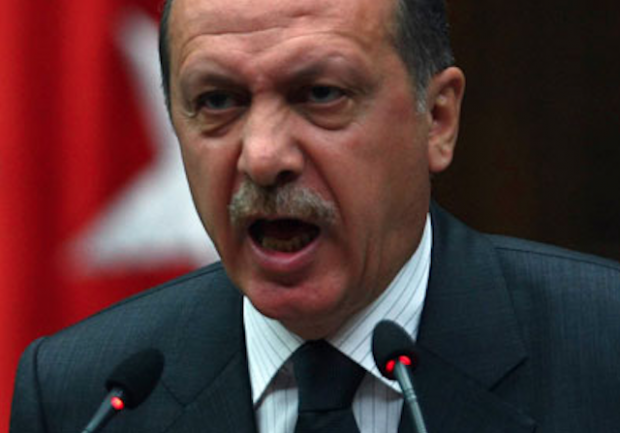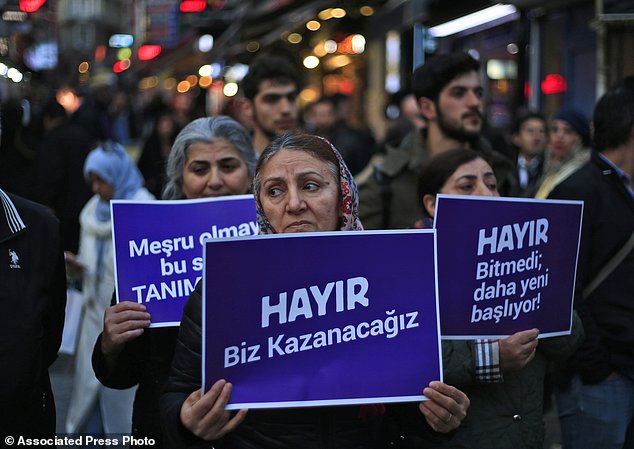(Fatih Polat, Evrensel, 19.4.17)
Due to its extremely oppressive atmosphere, the very public vote rigging and the unravelling political picture in its aftermath, the referendum of 16 April 2017 has been the most controversial vote in Turkish political history.
High Election Council’s (YSK) decision to accept unsealed envelopes and ballots while voting still continued – in direct contradiction with its own directive – was akin to changing the rules during the game. YSK stubbornly stands behind this unacceptable contradiction despite all objections. This behaviour bears witness to the fact that the Referendum of 16 April has been arbitrarily concluded by dominant political power relations.
TWO EXAMPLES WHY THE THE DECISION BY YSK IS UNACCAPTABILITY
Sadi Güven, the chair of YSK, stated that unsealed envelopes were accepted in an attempt to prevemt procedural mistakes by local ballot commissions – legally obliged to stamp envelopes and ballot papers – obstruct the constitutional rights of the electorate.
However, in this referendum, unstamped votes cast abroad have been declared void. The relevant decision is stated as “the objection to procedures at Voting Station 472 during the count of votes from abroad, lodged to AKP representative by Muhammed Bilal Haliloğlu, dated 16/04/2017 has been considered.”
DECISION IS MADE
“It is understood that Mr Haliloğlu’s petition stated “some ballot boxes at Voting Station 472 included unstamped envelopes and these votes were deemed void without opening. Kindly take the necessary action regarding opening of the envelopes.”
Article 98 of Key Voting Provisions and Voter Register Law 298 states that “Envelopes that do not fit the colour and design of those issued by the ballot commission; those without local voting commission and ballot commissions stamps; those completely ripped; those with any stamp, signature, finger print or markings other than that of the local voting commission and ballot commission stamps are void.” The same issue has been addressed by article 44 of mandate number 202/1 attached to decision number 103 by the YSK, dated 15/02/2017.”
Based on these reasons the decision taken on 17/04/2017 states that “the objectors demand that the envelopes unopened due to missing stamps be opened has been rejected.”
We should also remember that in Güroymak in 2014, the ballot had been cancelled by YSK due to a single unstamped envelope.
In its press conference on the referendum, Limited Election Observation Mission by Office for Democratic Institutions and Human Rights (ODIHR) of the Organization for Security and Co-operation in Europe (OSCE) have highlighted that the YSK decision is illegal.
Consequently, the claim by Kemal Özkiraz, the owner of Avrasya Public Opinion Research Centre (AKAM), that “the information I got from parties and ballot observers is that all of the unstamped vote have been ‘YES’ votes. This cannot be explained by a coincidence.” gains undeniable importance.
COMPERATIVE READING
The results cannot be ignored when the votes secured by AKP and MHP – the parties that proposed the change in Presidency voted on in the referendum – in the general elections of 1 November 2015 and the Referendum of 16 April are compared.
Firstly, President Erdoğan’s statement that “The rider has already gone past Üsküdar” [a Turkish proverb], based only on the unofficial Anatolian Agency [news outlet] data on the results, is ironic in terms of the stage he chose. In Sarıyer, where he made his speech, 59.13% voted for ‘No’. In Üsküdar, AKP(47.9%) and MHP(9.5%) got a total of 57.4% of the vote in 2015 but in the referendum 53.31% voted ‘NO’.
The city where Erdoğan made his speech is the metropolitan where the main fight against the attempted coup of 15 July – the event he primarily used to justify this referendum both in terms of its timing and historical significance – took place; but also, the city that Erdoğan lost in for the first time since the local elections of 1994; when he first became its Mayor.
Erdoğan also lost both in the neighbourhood of his Palace and the city it is in; Ankara. The national result is a highly disputable due to the continuing state of emergency (OHAL) but also the open breach of rules by the YSK. Despite all of this, standing on such a ground, thanking for “the support” one is given is significant.
In Ankara AKP (48.8%) and MHP (14.2%) got a total of 63% of the votes in the election of 1 November; in the referendum only 48.85% voted Yes. This is a drop of 14.15% which could not be ignored.
Likewise in Istanbul, while AKP (48.7%) and MHP (8.6%) got a total of 57.3% in the elections of 1 November, the No vote was 51.35% in the referendum; this indicates a drop of 8.65% for the ‘Yes’ vote
In the stronghold of MHP, Osmaniye, while AKP (46.8%) and MHP (34.6%) got a total of 81.4% in the elections of 1 November, the ‘Yes’ vote was 57.84%; indicating a very significant difference of 23.56%.
Evrensel had tried to accurately feel the pulse of the referendum. Our reporter Halil İmrek had been to Osmaniye and his article in the Evrensel on 9 March 2017 titled ‘the MHP stronghold of Osmaniye is distancing itself from Bahçeli’ foretold these results.
One of surprises in this referendum has been Eyüp; an area where AKP held the local authority for a long while and is frequently visited by President Erdoğan. While AKP (49.3%) and MHP (8.6%) got a total of 57.6% in the elections of 1 November, the ‘Yes’ vote in the referendum in Eyüp was 48.46%%; a drop of 9.44%.
The differences in Fatih should also be noted. In the elections on 1 November. AKP (52.2%) and MHP (8.1%) got a total of 60.3% of the vote; the ‘Yes’ vote in the referendum in Fatih was 51.38. The ‘Yes” campaign suffered a drop of 8.92% in this predominantly conservative area.
We also see a big difference when we compare the results in Soma; the town where 301 miners lost their lives in an accident – read murder – in a mine. In Soma in the elections of 1 November AKP (49.7%) and MHP (15.9%) got a total of 55.6% of the vote, the ‘Yes’ vote in the referendum in Soma was 53.1%; a drop of 12.5 for the ‘Yes’ coalition.
The results in Kayseri are also interesting. In this city AKP (65.6%) and MHP (18.4%) got a total of 84% of the votes in the elections of 1 November, the ‘Yes’ vote in the referendum in Kayseri was 67.76%; the ‘Yes’ coalition lost 16.24% of its votes in this city.
In Erzurum, a city of great support for the government, AKP (68.1%) and MHP (14.3%) got a total of 82.4% in the elections of 1 November, the ‘Yes’ vote in the referendum in Erzurum was 74.48%; a drop of 7.48%.
Some might think this result is due to Fethullah Gülen being from there, but Erzurum is a city where the recently deceased Mehmed Kırkıncı, an important name in the Nur Sect, is considered a ‘leader of opinion’ and he had decided to side with AKP in the elections of 1 November. It seems healthier to read the vote realignment in Erzurum as the reaction by some sectors of AKP and MHP grassroots in this city to the imposition of this referendum.
In Rize in the elections of 1 November, AKP (75.9%) and MHP (5.4%) got a total of 81.3% of the vote, the ‘Yes’ vote in the referendum in Erzurum was 75.55%. It was argued that Saadet Party voters in Rize that voted for AKP in 1 November elections would not do so in the referendum. This could have contributed to the 5.75% drop.
WHAT the RESULTS INDICATE
Throughout the referendum campaign the ‘No’ front argued that politics of polarisation only helped AKP; and that a positive, explanatory campaign should be run to win over those intending to vote ‘Yes’. I think this has had as much impact on the results as the split in MHP and the limited fracturing within the AKP.
We still cannot ignore the fact that a strong ‘personal cult’ tendency towards Erdoğan among the grassroots AKP supporters still exists. While opposing the dubious results of the Referendum, we should refrain from identifying them with fixed political identities such as AKP, MHP supporters. We should approach people with their real identities as workers, labourers, teachers, doctors, academicians; it is important to use a language for change when addressing those that voted for a different party in the past. For those that said No to ‘one man’, the only option for the future is patient, correct politics.

